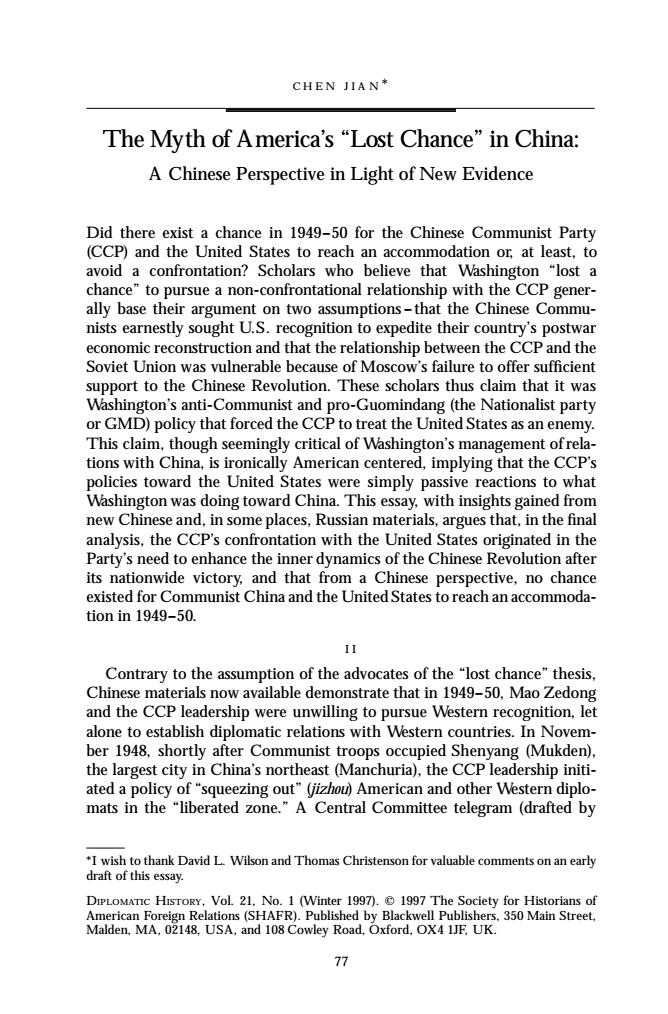正在加载图片...

CHEN JIAN* The Myth of America's“Lost Chance”in China: A Chinese Perspective in Light of New Evidence Did there exist a chance in 1949-50 for the Chinese Communist Party (CCP)and the United States to reach an accommodation or at least,to avoid a confrontation?Scholars who believe that Washington "lost a chance"to pursue a non-confrontational relationship with the CCP gener- ally base their argument on two assumptions-that the Chinese Commu- nists earnestly sought U.S.recognition to expedite their country's postwar economic reconstruction and that the relationship between the CCP and the Soviet Union was vulnerable because of Moscow's failure to offer sufficient support to the Chinese Revolution.These scholars thus claim that it was Washington's anti-Communist and pro-Guomindang(the Nationalist party or GMD)policy that forced the CCP to treat the United States as an enemy. This claim,though seemingly critical of Washington's management ofrela- tions with China,is ironically American centered,implying that the CCP's policies toward the United States were simply passive reactions to what Washington was doing toward China.This essay,with insights gained from new Chinese and,in some places,Russian materials,argues that,in the final analysis,the CCP's confrontation with the United States originated in the Party's need to enhance the inner dynamics of the Chinese Revolution after its nationwide victory,and that from a Chinese perspective,no chance existed for Communist China and the United States to reach an accommoda- tion in 1949-50. II Contrary to the assumption of the advocates of the "lost chance"thesis, Chinese materials now available demonstrate that in 1949-50,Mao Zedong and the CCP leadership were unwilling to pursue Western recognition,let alone to establish diplomatic relations with Western countries.In Novem- ber 1948.shortly after Communist troops occupied Shenyang(Mukden). the largest city in China's northeast(Manchuria),the CCP leadership initi- ated a policy of "squeezing out"(izhou)American and other Western diplo- mats in the "liberated zone."A Central Committee telegram(drafted by 'I wish to thank David L.Wilson and Thomas Christenson for valuable comments on an early draft of this essay. DIPLOMATIC HIsToRY,Vol.21.No.1 (Winter 1997).1997 The Society for Historians of American Foreign Relations(SHAFR).Published by Blackwell Publishers,350 Main Street, Malden,MA,02148.USA,and 108 Cowley Road,Oxford,OX4 1JF,UK. 77C H E N J I A N * The Myth of America’s “Lost Chance” in China: A Chinese Perspective in Light of New Evidence Did there exist a chance in 1949–50 for the Chinese Communist Party (CCP) and the United States to reach an accommodation or, at least, to avoid a confrontation? Scholars who believe that Washington “lost a chance” to pursue a non-confrontational relationship with the CCP generally base their argument on two assumptions – that the Chinese Communists earnestly sought U.S. recognition to expedite their country’s postwar economic reconstruction and that the relationship between the CCP and the Soviet Union was vulnerable because of Moscow’s failure to offer sufficient support to the Chinese Revolution. These scholars thus claim that it was Washington’s anti-Communist and pro-Guomindang (the Nationalist party or GMD) policy that forced the CCP to treat the United States as an enemy. This claim, though seemingly critical of Washington’s management ofrelations with China, is ironically American centered, implying that the CCP’s policies toward the United States were simply passive reactions to what Washington was doing toward China. This essay, with insights gained from new Chinese and, in some places, Russian materials, argues that, in the final analysis, the CCP’s confrontation with the United States originated in the Party’s need to enhance the inner dynamics of the Chinese Revolution after its nationwide victory, and that from a Chinese perspective, no chance existed for Communist China and the United States to reach an accommodation in 1949–50. I I Contrary to the assumption of the advocates of the “lost chance” thesis, Chinese materials now available demonstrate that in 1949–50, Mao Zedong and the CCP leadership were unwilling to pursue Western recognition, let alone to establish diplomatic relations with Western countries. In November 1948, shortly after Communist troops occupied Shenyang (Mukden), the largest city in China’s northeast (Manchuria), the CCP leadership initiated a policy of “squeezing out” (jizhou) American and other Western diplomats in the “liberated zone.” A Central Committee telegram (drafted by *I wish to thank David L. Wilson and Thomas Christenson for valuable comments on an early draft of this essay. DIPLOMATIC HISTORY, Vol. 21, No. 1 (Winter 1997). q 1997 The Society for Historians of American Foreign Relations (SHAFR). Published by Blackwell Publishers, 350 Main Street, Malden, MA, 02148, USA, and 108 Cowley Road, Oxford, OX4 1JF, UK. 77